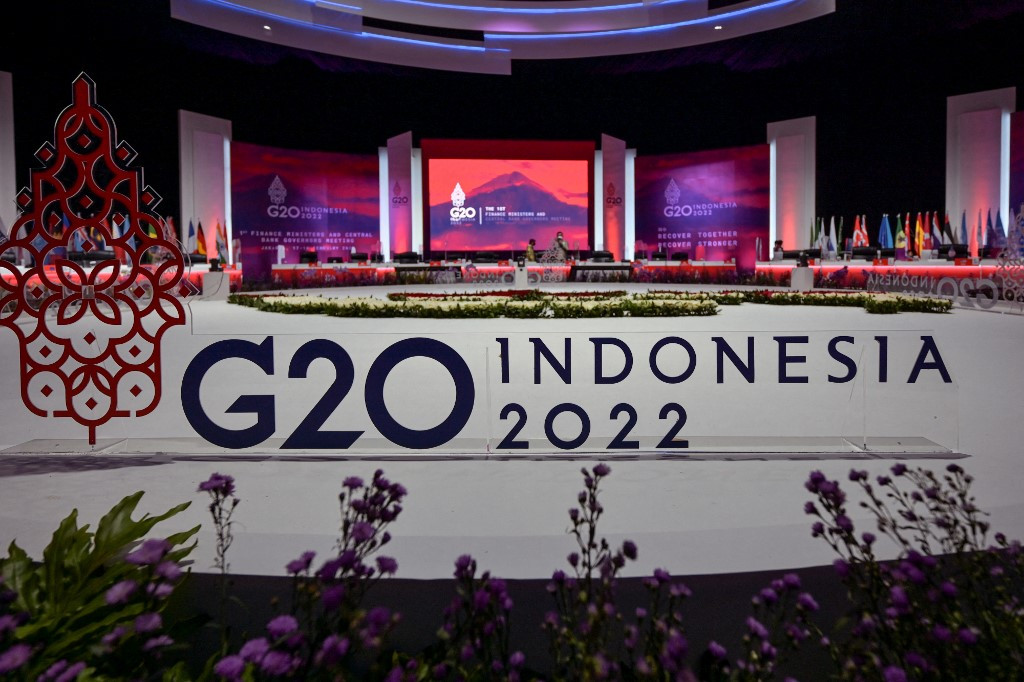Popular Reads
Top Results
Can't find what you're looking for?
View all search resultsPopular Reads
Top Results
Can't find what you're looking for?
View all search resultsIndonesia shifts G20 focus to energy security
Energy talks to be broadened beyond emissions reduction.
Change text size
Gift Premium Articles
to Anyone

The Office of the Coordinating Economic Minister has vowed to focus on energy security in the first round of the G20 sherpa track working groups, as the war between Russia and Ukraine and sanctions imposed on Russia exacerbated an increase in global energy prices.
During a press briefing at the ministerial office, Deputy Coordinating Economic Minister and G20 co-sherpa Edi Prio Pambudi said such an adaption of the agenda was needed to maintain the relevance of Indonesia’s G20 presidency for solving current challenges.
Indonesia’s G20 presidency from the outset has been focused on three thematic pillars: strengthening the global healthcare architecture, digital transformation and energy transition.
"Now it means that, in the discussion of energy, it is not the about energy transition only [but also] energy security. Because in the end, it cannot be done quickly," Edi told reporters on Monday.
Read also: G20 Indonesia and energy transition: Now or never
Edi explained that, due to the war in Ukraine, some G20 member states were considering re-allocating a significant portion of their energy transition budgets to energy subsidies.
Statistics Indonesia (BPS) data shows that crude-oil prices have increased 64.28 percent year-on-year (yoy) to US$103.4 per barrel (bbl), while natural gas prices have risen threefold to $32 per million British thermal units (mmbtu).
"When we accompanied the Coordinating [Economic] Minister [Airlangga Hartarto] from Davos to Germany, we could sense that the locals were anxious about the gas flow stopping. Imagine -- the industry collapses -- unemployment creates social unrest. This is currently happening in Europe," Edi continued.
As a result, he said, Indonesia as the G20 president was facing a severe challenge in balancing the need for energy transition as its main agenda point with the need for energy security, as even developed countries were beginning to change their priorities.
"What is the relevance here, when we talk about climate change to reduce carbon emission, while they [other G20 members] want to return [to conventional energy] to maintain their energy security? So, this is our homework," Edi added.
Read also: Why Indonesia should not fail its G20 presidency
Edi contended that one of the main challenges for Indonesia's G20 presidency was the economic sanctions the United States and its allies imposed on the Russian Federation, as geopolitical considerations hampered discussions on the energy transition.
"The price goes up not because there's no stock -- the stock is there, but it can't be sold. Why can't it be sold? Because there are sanctions. Why are there sanctions? To stop the war. The war should be stopped first, but if the war is stopped, will the sanctions be lifted? Not necessarily," Edi continued.
On the same day, Indonesia G20 sherpa secretariat released a report on the progress of the first-round sherpa track working groups, which includes the Energy Transition Working Group (ETWG) under the Energy and Mineral Resources Ministry.
The report states that all delegations agreed to the proposed three pillars of energy transition: the securing of energy access, the scaling-up of smart and clean energy technologies and the advancement of energy financing.
Further negotiations are to be held at Labuan Bajo, East Nusa Tenggara, on June 23-24.
Institute of Essential Services Reform (IESR) director Fabby Tumiwa said the shift to focus more on energy security in the G20 discussions was tolerable as Indonesia should adapt to the economic concerns of G20 member states.
"The discussion of energy security in the energy transition […] faces many challenges -- to do with sources, availability of infrastructure, investment and energy-price planning. The energy transition is a process that must not neglect the security of energy supply and the affordability of energy prices," Fabby said in a phone call with The Jakarta Post on Tuesday.










